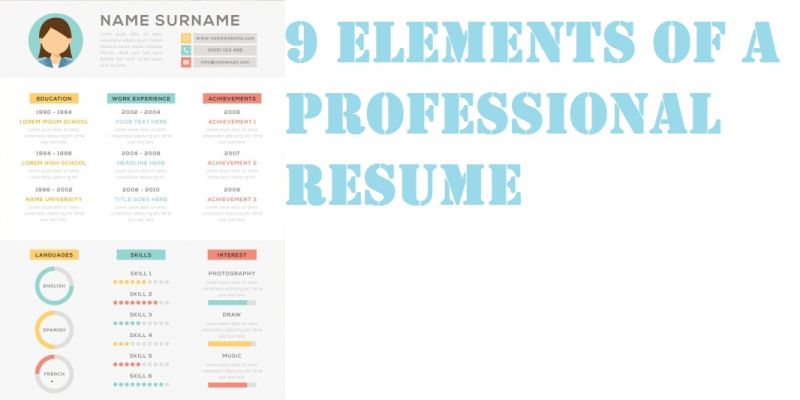
A professional resume is among the most obsessed over document in a person’s life. This is because it has to be impeccable in in order to make a great first impression on a hiring manager. An average recruiter takes about six seconds to review a resume and decide whether to retain it or put it in the "No†pile.
Therefore, you have to make your professional resume stand out in order to get a chance of landing your dream job. Below is a list of key components to include in a great professional resume:
1) An Organized Layout
A well organisaed and detailed front end is the perfect gateway to earning a recruiter’s attention. When employers review resumes, they are probably going through a stack of them. Given the limited time they have for review, organizing your resume in an appealing manner will surely land you in the next recruitment step.
2) Contact Information
Your potential employer want to know who they are dealing with. It may seem obvious, but applicant sometimes forget to include their contact information. Within this section, which comes at the top of the page, you should list:
- Name and address
- Phone number
- E-mail address
- URL to your LinkedIn profile.
3) Objective Statement
When a recruiter reviews your resume, ensure the role you are seeking is clearly stated. Use this part to let your employer know of your career goal. It can simple be your professional title such as "Senior Editing Professionalâ€. This should come immediately after your contact information or above your professional summary. You could also write your object statement in an extensive way for more emphasis.
Example: "To acquire a challenging position as a senior editor in the financial services sectorâ€
4) Summary Statement
Your career narrative captures you employer’s attention by highlighting your qualifications. A recruiter may not have sufficient time to read your entire resume. Therefore, a professional summary provides a brief overview of your achievements, experiences, and skills. There are two ways to make a bold case in this section:
- Keywords – basically, this include all the important words your employer expects to see in line with the job posting. Using keywords is especially helpful when the recruiter is using an electronic scanning system. You can find appropriate keywords to include by searching commonly use terms in the job description.Essentially, keywords help match an applicant to a job description. Additionally, other objective keywords you could use to increase your chances of standing out include "hardworking†and "reliableâ€
- Verbs- rely on verbs and not adjectives to make your language appear direct and succinct. Employers tend to favour verbs like "delivered†and "managed†that portray a sense of action and accomplishment.
5) Employment History
This is simply your career narrative. Be sure to present your professional history in an interesting manner. The most straightforward method you can use is the chronological format where you list your current job going backwards in time. In the details, write your job title, employer’s name, and the city in which the company is situated. Also, include the start and end dates of your employment.
6) Achievements
Employers need to know about your contribution to the growth of your company. Giving your accomplishments helps your employers determine whether your strengths align with the requirements of the job opening. It would be more effective if you gave these successes in measurable terms. Metrics add size and scope to your statements thereby making your resume stronger
7) Education
Document your educational achievements, beginning with your most recent or highest degree.
8) Relevant URLs
Including links that reference to websites, which highlight your personal brand is a great way to give managers a better sense of your expertise and personality. These could be a URL to your LinkedIn profile, blog, or online portfolio.
9) Other Information
This include extra experiences that are a plus to your career. Such information may comprise volunteer work, award, hobbies, and membership to organizations.
Pro Tip
Observe Good Spelling and Grammar
This step is very crucial in determining how recruiters interpret your efforts of making the application. Take your time and proofread your professional resume before submitting. if you need someone to proofread your resume, hire our writers to do it for you.
Final Words
No matter your ambition and optimism in searching for a job, it is good to be realistic. If you find a job that, you are confident you can do, go for it and give it your all in that application. However, if the job description requires more skills than you can offer, then do not apply.
If you have found that job opportunity that you’ve always being looking for but don’t know how to write your professional resume, turn to us and we will help you make your dream come true.
